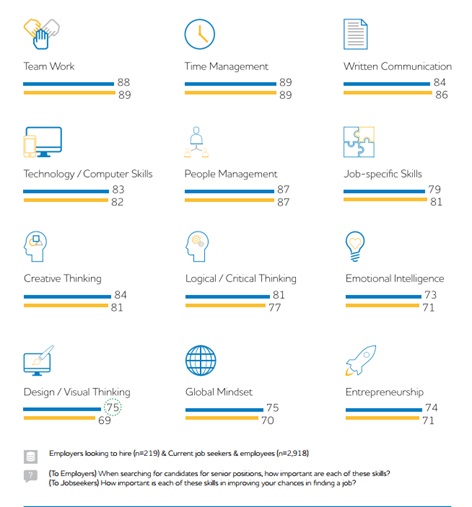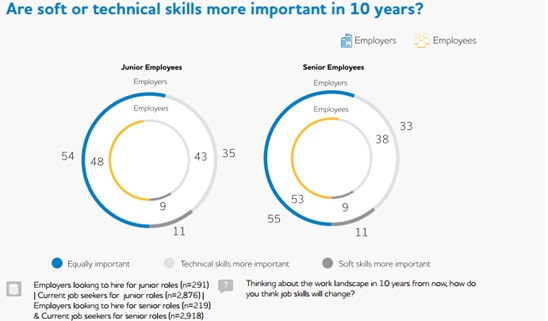
Skills gap has become a buzz expression in recent years. But it isn’t a groundless theory. There are some trends in the market, which have already started impacting our lives and have the potential to have irreversible consequences on the way people live, work and think. Let us name just a few and try to imagine what these consequences will be on the short and long run in the job market.
First, there is the technological acceleration. More than half of the world population will be online by 2021. By 2030, the share of online population incidence in the GCC will be anywhere from 85 to 95%. Egypt and Levant will be in the world average, at around 50%. By 2020, 54% of the Middle East and Africa population will have a mobile phone.
In today’s world of artificial intelligence and automation, many jobs that are now being done by human can render that human useless, or an expensive liability. This has been happening for decades. Just look at the horse driven carriages, horses were replaced with engines, making the horse useless. Today, the car, operated by a human, will no longer need the human operator. Especially with the rise of autonomous vehicles and the smarter-by-the-day AI systems that automakers like Tesla and Mercedes-Benz are implementing in their cars.
Not needing a human to do a job is something that exists in all industries. From factories to now lawyers and physicians that are slowly being replaced with AI system that can do the tedious, monotonous, work, leaving humans to focus on process enhancements and system developments.
All of the aforementioned begs the question: Will my job be secure in 10 years?
And to answer that, Bayt.com, the Middle East’s #1 Job Site, had to look into the different industries in the MENA and figure out what skills are missing today and see if the skills gap is a real thing or a simple talking point.
Bayt.com and YouGov’s recent report on the state of skills and the skills gap in Middle East revealed eye-opening information about the MENA and the skills that employees lack, in addition to many insights about the state of the professional sphere.
From the data, we were able to find a prominent lack in skills that require inter-personal and communication intelligence. Aside from time management, the most important skills demonstrated a need for human and emotional intelligence.
This shows us that although robots could be taking over in a couple of decades, humans who know how to work with humans will still have a place in the marketplace, for now at least.
Which skills are in high demand in today’s market? According to respondents, the top three skills for junior roles were:
All these skills can easily be developed through online courses or literature that is physically and digitally available. Technical or job-specific knowledge, which could be learned during university or higher education, falls in the 6th spot after soft skills that can be acquired at any time. This underscored the importance of personal development and on the job training beyond formal and technical education.

When it comes to senior roles, the below were the top three most critical skills.
The previously mentioned skills are not education related and are vital for junior and senior employees alike. Therefore, it is important to work on developing these skills to succeed in today’s business world.

While the most critical skills for both junior and senior roles are not that different, written communication looks like a skill junior employees should be able to excel in if they seek success in today’s business world. As much as it is important to be able to master the technical requirements of a job, these soft skills can play a big part in your career progression and success.
Future Proofing
Additionally, we asked, both employers and employees, if technical skills or soft skills are going to be more important in the future. Surprisingly, and although the majority of junior job seekers think technical skills will be equally important as soft skills, 43% of junior job seekers seem to think that technical skills will be more important in the future.
Although robots might replace humans, these robots are built, maintained, and developed by humans. Intricate details of the tech-driven business world might, indeed, require technical excellence.

Employers and employees who participated in this research seem to expect some skills that are most critical in 2017 to change in ten years. Stating skills such as creative thinking, computer skills, and time management to be of most importance in 2027.
It is only the future which will show if new skills such as translating data into insights, new media literacy, effective communication channel management, or virtual collaboration will become the cornerstones of success.
About the Middle East Skills Report:
The Bayt.com and YouGov report on the state of skills and the skills gap in Middle East and North Africa (MENA). In its latest edition, Bayt.com introduces you to the latest trends in the demand and supply of skills, how are they going to impact the labour market, and the skills businesses will search for tomorrow. Additionally, the report analyses in more detail the state of the skills gap in the MENA region based on the most recent online survey conducted by YouGov and Bayt.com.